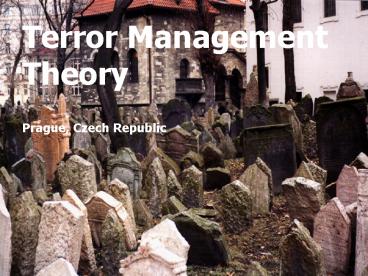Terror Management Theory (TMT) - PowerPoint PPT Presentation
1 / 14
Title:
Terror Management Theory (TMT)
Description:
Seeing that culture our individualized worldviews are vital to ward off death anxiety, people should staunchly defend their worldviews (that is, ... – PowerPoint PPT presentation
Number of Views:274
Avg rating:3.0/5.0
Title: Terror Management Theory (TMT)
1
Terror Management Theory Prague, Czech Republic
2
TMT and Existential Psychology
- Existential psychology began in reaction to
Freuds theories - Both Freudian and existential approaches explore
the motivational consequences of human
(unconscious) conflicts - However, they differ in which conflicts
fundamentally influence human behavior - For Freud the conflict is sex and agression
- For existentialists its our search for meaning,
freedom, coherence ultimately stemmed from the
fear of death
3
TMT Beginning
- TMT developers Jeff Greenberg, Tom Pyszczynski,
and Sheldon Solomon - Penned theoretical papers explaining TMTs
principles (1986) - Theory is based on Ernest Beckers (1976) The
Denial of Death
4
TMT Main Tenets
- Fear of death is
- innate
- universal
- unique to humans
- Self-awareness leads to death awareness (i.e.
recognition that death is unstoppable and
unpredictable) - Fear of death fundamental source of human
conflict and anxiety - Death naturally conflicts with our powerful
self-preservation and freedom instincts
5
TMT Main Tenets
- Ultimate motive to manage this terror
- Thus, TMT holds that human behavior fundamentally
demonstrates how we cope or manage this anxiety
this terror of death - But how often do we think about death?
- We learn to automatically that is,
unconsciously repress and manage the fear of
death using a dual-component buffer
6
TMT Main Tenets
- Initial reaction to death awareness is conscious
suppression of death thoughts Generally
successful (low DTA) - After delay, unconscious DTA increases
- Activates psychological strategies to defend
against death terror - Focus on ones culture (more enduring than the
individual provides meaning and support) - Focus on self-esteem
7
1. Mortality Salience hypothesis
- states that when people are reminded of death
(mortality salience), they will use various
terror management (defense) mechanisms to rid
death thoughts from the mind to return to a
composed psychological state - Seeing that culture is vital to ward off death
anxiety, people should defend their worldviews
after mortality salience (i.e., elicit worldview
defense) - Worldview defense can either involve
- a) criticizing others disparate worldviews or
- b) praising others who uphold your worldview
8
Your worldview sucks!
Im going to live forever!
DELAY
Proximal Effects
Distal Effects
9
First empirical studies
- Rosenblatt et al. (1989)
- Completed mortality questionnaire (write about
your death) or not - Judges read case brief and then allotted bail to
the alleged prostitute - amount ranged from 1 - 999
- Results
- After mortality salience 455 vs.
- Control condition 50
10
Rosenblatt et al. (1989) cont.
- Also added heroine condition in which Ps
allotted reward amount to female who apprehended
thief (1,000 - 4,000) - After mortality salience 3,476 vs.
- Control condition 1,112
11
Mortality Salience Results
- MS not only affects attitudes
- e.g., increased derogation of various outgroup
members (e.g., Christians vs. Jews) - But also overt behavioral responses
- Increased aggression against worldview
transgressors (e.g., allotted more hot sauce to
targets who criticized ones political views) - Decreased affiliation with dissimilar others
(e.g., where one chooses, if at all, to sit with
worldview threats) - And death thought accessibility
- BUT ONLY AFTER A DELAY
12
2. The Anxiety Buffer hypothesis
- states that high self-esteem, shields
individuals from experiencing (death) anxiety - Empirical research says
- Greenberg et al. (1992) High self-esteem
lessened self-reported anxiety - in anticipation of electric shocks
- in response to graphic video
- in response to receiving information detailing a
short life expectancy - Self-esteem also moderated Ps physiological
response in anticipation of electric shocks
13
(No Transcript)
14
(No Transcript)

